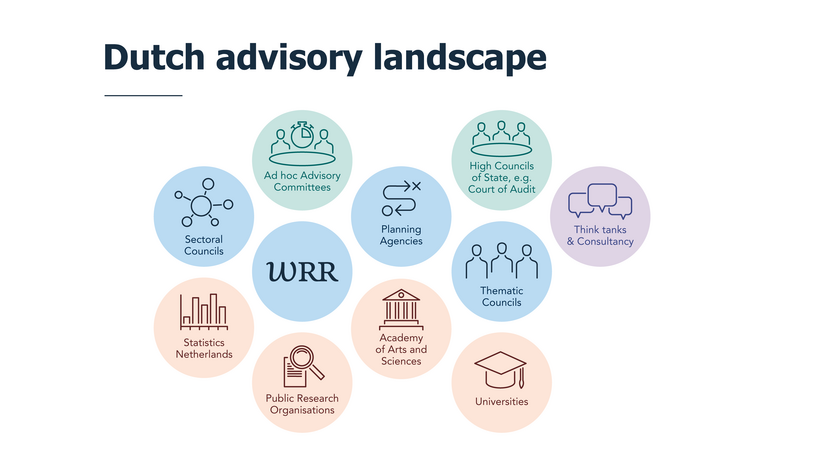National/international context
The WRR is part of a rich Dutch advisory landscape consisting of several councils and other bodies, each with its own specific tasks.
This ecosystem is characterized by a core of planning agencies and councils, which are directly connected to the various ministries. These planning agencies provide policy-relevant analyses and projections. The sectoral and technical councils provide strategic policy advice on specific areas or topics. Within this landscape, the WRR addresses issues that are not tied to any one policy sector, with a focus on the overall direction of government policy for the longer term. Our craftsmanship focus on translation to and from science. More specifically, we translate societal issues into policy problems, followed by scientific questions. We are also committed to explaining the policy relevance of scientific findings and formulating policy advice that is both feasible and acceptable. The WRR is free to determine its own work programme and the content of its publications. The independence of the WRR is further guaranteed by the public nature of all of its work.
International context
The Netherlands is a founding member of what is now the European Union. It is a medium-sized country with a multicultural society, an ageing population and a knowledge-based trading economy. Many of the policy challenges that the country is facing are shared by other industrialized democracies. By making our internationally relevant publications available on this website, as well as through our open access Research for Policy series with Springer, we hope that that our analyses, insights and recommendations will contribute to informed policy debate in other countries and within international fora.
The WRR is an active member of the European Science Advisors Forum (ESAF) and the International Network for Government Science Advice (INGSA). It aims to cooperate with organizations in other countries that also provide science-based policy advice. Our goal in this regard is not only to contribute to policy debates in other countries, but also to learn from other experiences and science-based advice. Examples of cooperation include webinars on the fall of the middle class and digitalization in times of growing dependence on digital means (co-organized with France Stratégie) and our contribution to the JRC workshop series entitled Strengthening and connecting ecosystems of science for policy across Europe. The council also participates on behalf of the Netherlands in the advisory committee of the EU project 'Building capacity for evidence-informed policymaking'.

